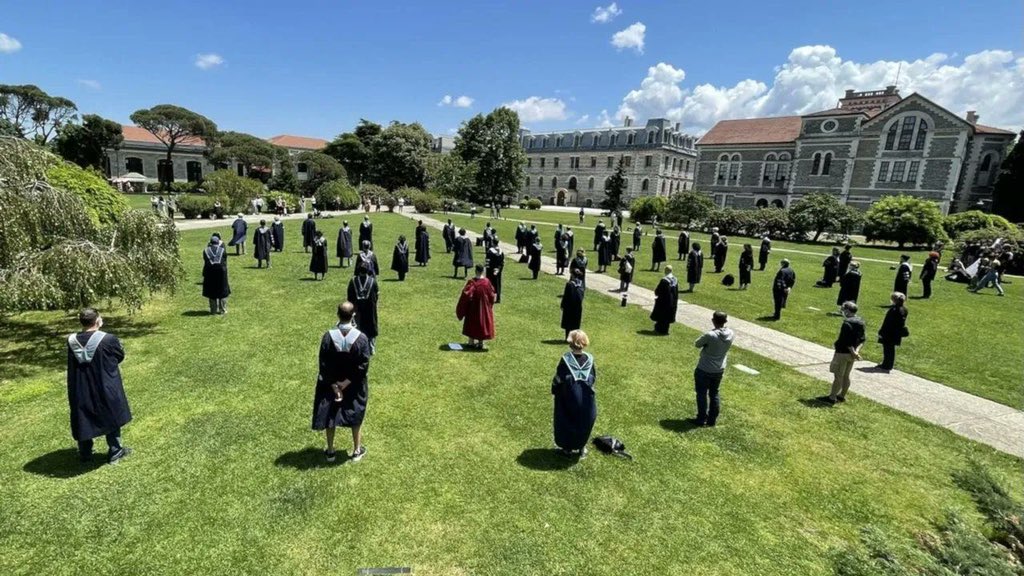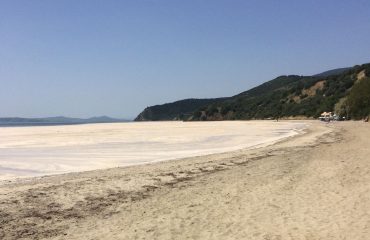

Since the first days of 2021, protests and peaceful resistance of Boğaziçi University (BU) faculty triggered by an overnight and unexpected appointment of a rector by the President of the Republic has occasionally occupied the headlines of news and social media. Students have also joined in sporadically since student presence on campus has been limited due to Covid-19 measures. What is so novel about this peaceful protest and resistance? Certainly, it has been more sustainable than many past similar events. Furthermore, it shows no signs of abating as faculty continue with resolve their lunchtime vigil by turning back their backs for half an hour to the building that houses the rectorate.
History of Boğaziçi University
Brief info about BU is necessary to make sense of the recent developments. BU is the successor institution to Robert College (RC), an American-Turkish institution founded in 1863 by American missionaries. Yet, RC very quickly shed its missionary character and became an institution of secular learning preferred by Christian minorities of different sects of the Ottoman Empire. Muslim and Turkish students also attended the school. With the establishment of the Republic in 1923 Robert College became a part of the secular education system of the Republic. It was attached to the Ministry of National Education. The institution had a middle school of 3 years, a lise (high school) of four years. Those students wishing to study engineering could move on to the engineering program after their sophomore year which lasted for four more years. The school was governed by a Board of Trustees composed of Turkish and American members. Meetings took place alternatively in New York and Istanbul. Starting in 1957 the school expanded further into higher education with the establishment of business administration and some arts and science programs in addition to different engineering departments. With mounting expenses and rising left-wing movements not sympathetic to private and foreign higher education, the Board of Trustees of RC reached an agreement with the Turkish government to turn over one of the campuses on the condition that a new Turkish university will be founded based on the RC higher education programs. Thus, BU was born in 1971 as an autonomous university with its special law.
BU inherited from RC a very beautiful campus situated on the steep hills on the shores of the Bosporus halfway between the Black Sea and the sea of Marmara. Its stunning location is a legend both nationally and internationally. Yet, values and the education system is probably the most important part of that inheritance. Ethnic, religious and cultural plurality of RC had a very important impact on the new institution. Respect for the individual and blindness to all kinds of differences were values imported from RC. 1970’s witnessed the successful internalization of those values by the new institution. What made that process easier was the attractiveness of the liberal tradition of BU to highly qualified faculty from other universities, especially from the Middle East Technical University (METU) in Ankara, who were seeking refuge from student unrest on their campuses. Many of the newcomers either were RC alumni or had completed their PhDs in the United States. 1970s is an important period in the history of the institution in terms of formation of an institutional culture based on respect for the individual, a student oriented liberal education system based on a search for academic excellence, and an emphasis on pluralism. In fact BU soon came to be recognized as an aquarium or a living space where students and faculty enjoyed their freedoms. I never forget a comment a student of mine made in the late seventies: “Sir, this campus is like Switzerland in the midst of the Second World War.” Student unrest and political violence was an important characteristic of Turkey during that period. Almost all universities, with the exception of BU, were running behind several terms in their academic programs due to very frequent student boycotts. BU also had its mini student boycott. The issue was the grading system. Students were not happy with existing system (A,B,C,D,E,F) and demanded that it be changes to AA, BA, BB, CB etc. The faculty in discussed it and accepted the demand. That was it.
The governance system
In order to make sense of sustainable faculty protests one must look at the system of governance of the institution as a part of its institutional culture. RC presidents were not elected. They were appointed by the Board of Trustees. Presidents in turn appointed their Turkish vice-president. What is important to remember is that the system was not democratic if you define democracy as elections. But, it is important to emphasize that the system was certainly very transparent and participatory. Deans of schools were elected. First founding BU rector, late Aptullah Kuran, was appointed by the Ministry of National Education in September 1971. He was a respected faculty member and served as the Turkish vice-president from 1968 to 1971 during RC years. Under his stewardship the culture of governance inherited form RC remained intact. Many decisions were taken at faculty councils that regularly met. A University Council composed of all faculty also convened frequently. The period after 1971 witnessed two elections of rectors. First one was at 1976 when Aptullah Kuran was re-elected by the faculty. The second in 1979 when Semih Tezcan took over after a tight competition. The enactment of the controversial Higher Education Law (2547) after the military takeover of 1980, resulted in a shocking surprise for the BU community, faculty and alumni included. A new rector, Ergün Toğrol, was appointed in 1982 by the Higher Education Council (HEC) without any consultation with the university whatsoever. Toğrol was a member of the Istanbul Technical University and had no previous connection to BU. This out of the blue moon appointment created a shock wave of resentment among BU faculty. An atmosphere of somewhat uneasy co-existence persisted under Toğrol’s careful stewardship between 1982 and 1992. The institution kept its transparent and participatory system intact at faculty and school levels despite the fact all deans were appointed by the Rector. Yet, the quite popular University Council was never convened.
New rectors affiliations with political parties
Early ‘90s witnessed efforts by the faculty to lobby for a more transparent system of rector selection. In fact in May 1992 the faculty autonomously and unofficially convened the University Council and held elections to determine four candidates to be submitted to HEC for the upcoming rector appointments. To his credit rector Toğrol never interfered with these unofficial meetings. The summer months of 1992 witnessed surprising developments as Law 2547 was amended and a system of hybrid of elections and appointments became the hallmark of rector appointments. According to this amendment, the university faculty will rank order six candidates and submit the list to HEC. In turn HEC would narrow the list down to three with its own rank ordering and submit it to the President of the Republic for final appointment. Between 1992 and 2016 the first choice of BU faculty was appointed, without fail, as rector. This was an important exception for the Turkish higher education system. The other universities occasionally had to contend with second or third choices. In 2016, the serving rector, Gülay Barbarosoğlu, was elected by a large majority for a second term. Yet, the President of the Republic appointed Mehmed Özkan who was serving as vice-rector under Barbarosoğlu. Özkan was not a candidate in elections. This surprise appointment created a shock among the faculty and the students leading to peaceful protests. Yet, protests and resistance subsided as Özkan was a well-respected faculty member and a former undergraduate student of BU. Furthermore, his successful leadership sensitive to the values and the culture of the institution helped ease tensions and all expectations were that he would be reappointed in November of 2020. The appointment of Melih Bulu in the early days of 2021 came as an absolute shocking surprise. The only affiliation he claimed with BU was as a graduate student working for his PhD. On the other hand his affiliations with political parties was disturbing for faculty reputed for distance from active politics and commitment to independent research and teaching. We must note in passing that since 2016, law was amended by Presidential decree giving all powers of appointment to the President of the Republic. This, of course, added insult to injury.
Protecting the students
BU occupies a special place in Turkish higher education system with is commitment to academic freedom and institutional autonomy. BU community see these values as essential to guard its institutional culture entrenched in a commitment to the individual, transparency, participatory governance and a liberal education system. BU, true to its institutional culture, was able to protect its left-wing students in the early ‘80s when there was a witch hunt after the military intervention of 1980. Similarly, after the “military intervention by decree of February 1997” BU was successful in protecting its students when female students with headscarves were banned from many other universities.
These values occasionally come into conflict when authoritarian tendencies are on the rise as the institution may be viewed as foreign to the values of the society at large. BU as an institution has always been faced with a dilemma. It attracts best academic talent and students in the country. Yet, on the other hand, doubts about the institution being “truly national” often surface in society. Perhaps an anecdote related by the late rector Kuran helps understand that dilemma. A member of parliament (MP) in the ‘70s made, according to Kuran, a scathing criticism of the university during budgetary discussions. The gist of his criticisms brought into attention the language of instruction (English) and historical links as foreign to the local culture. During a break, the same MP approached Kuran and asked how he could get his son enrolled at BU. Cognizant of the good academic standards of the university and its liberal institutional and the threats that may come from without, the community clings on jealously to those values. Adding to that resolve is the fact rector elections and succession has been a very smooth and civilized process. Furthermore, according to international academic standards the performance of the university has improved between 1992 and 2020 when elections were the rule of the day.


